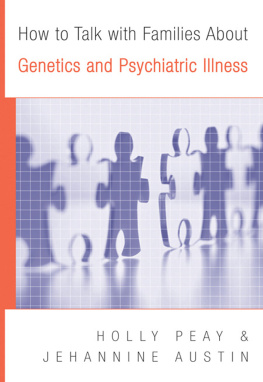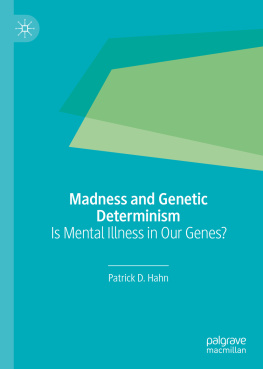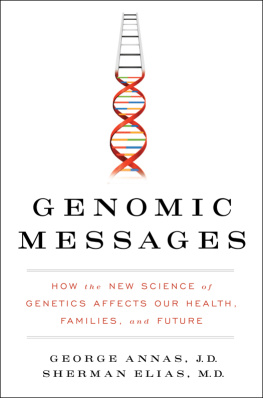How to Talk with Families
About Genetics and
Psychiatric Illness
Holly Peay
Jehannine Austin

W. W. Norton & Company
New York London
Jar model illustrations reproduced by permission of Cindy Campbell-Lashley
Copyright 2011 by Holly Peay and Jehannine Austin
All rights reserved
For information about permission to reproduce selections from this book, write to
Permissions, W. W. Norton & Company, Inc., 500 Fifth Avenue, New York, NY 10110
Library of Congress Cataloging-in-Publication Data
Peay, Holly.
How to talk with families about genetics and psychiatric illness / Holly Peay, Jehannine Austin.1st ed.
p. ; cm.
A Norton professional book.
Includes bibliographical references.
ISBN: 978-0-393-70679-6
1. Mental illnessGenetic aspects. 2. Family counseling. 3. Linkage (Genetics) 4. Family counselingGenetics. I. Austin, Jehannine. II. Title.
[DNLM: 1. Mental Disordersgenetics. 2. Family Relations. 3. Genetic Counselingmethods. 4. Medical History Taking. WM 140]
RC455.4.G4P43 2011
616.89'042dc22 2010034793
W. W. Norton & Company, Inc., 500 Fifth Avenue, New York, N.Y. 10110
www.wwnorton.com
W. W. Norton & Company Ltd., Castle House, 75/76 Wells Street, London W1T 3QT
Contents
Acknowledgments
D uring the writing of this book, I was supported by the Canadian Institutes of Health Research, the Michael Smith Foundation for Health Research, and the Provincial Health Services Authority of British Columbia.
I would like to gratefully acknowledge the mentorship of Dr. W.G. Honer, and the support of my fantastic research team without whom it would have been impossible to devote the time necessary to complete this project. Special thanks go to Catriona Hippman, Angela Inglis, Andrea Ringrose, and Emily Morris.
I would also like to thank all the individuals who have mental illness and their family members with whom I have had the privilege of interacting, and from whom I have learned so much about how to talk to families about genetics and mental illness.
Thanks to Claudea for the mental illness jars artwork that we use in Chapter 4! Thanks too to Erin Michalak for bravely rescuing me from a black bear that terrified me in the middle of the night while I was on a retreat, writing this book!
Last, but most of all, this book would not have been possible without the support and encouragement of my family: Sonia, my brother Ben, and my parents Chris and Hedley. Thank you!
Jehannine Austin
During a period of the writing of this book, I was supported by the intramural program of the National Human Genome Research Institute of the National Institutes of Health. I greatly appreciate the support and tolerance of my husband, Clint Peay, and my children Miles, Alec, and Simone. Joseph McInerney and Barbara Biesecker have been, and continue to be, inspirational mentors. Finally, my deepest appreciation goes to the clients and research participants who have shared their stories with me.
Holly Peay
Preface
Y our client asks you, Why did I get this psychiatric illness?
Your clients sibling asks you, Will it happen to me, too?
What if you could answer these questions in a meaningful way?
Imagine the effect on your clients, their families, and on public health. Consider the emotional, economic, and ethical implications in your practice and in society. As we continue to gain knowledge related to the causes of psychiatric illness, we are better able to answer these questions for clients and their relatives.
Clients first question about the cause of their illnessWhy did I get this psychiatric illness?is often accompanied by a second: Does this mean that other people in my family are more likely to develop this illness? This question is usually associated with considerable fearso much so, in fact, that healthy relatives of individuals with psychiatric illness frequently overestimate the chance of other family members becoming ill, and may decide not to have families of their own as a result of the fear that their children might develop one of these devastating illnesses (Austin, Smith & Honer, 2006).
The purpose of this book is to provide you, the mental health clinician, with tools to address spoken or unspoken questions about why and how the illness developed and about risks of other family members becoming affected. This book will also help you identify clients who would benefit from a referral for a consultation with a genetics professional. We have focused this book on major psychiatric illnesses that typically arise during adolescence or young adulthood, including bipolar disorder, schizoaffective disorder, and schizophrenia. We chose this focus because, compared to other psychiatric illnesses, more is known about the causes of and risks for these disorders, and they represent the area in which we (the authors) have the most experience. The general concepts in this book, however, can be applied just as easily to other mood and psychotic disorders as well as other disorders such as autism, attention-deficit/hyperactivity disorder, alcoholism, eating disorders, obsessivecompulsive disorder, and Tourette syndrome.
We appreciate that many mental health clinicians have limited interactions with unaffected relatives of clients, and that the interactions that do occur may be confined to specific topics. However, because issues around the causes of psychiatric illnesses and the risks to unaffected family members are so pertinent to relatives of affected individuals, we highlight them and encourage clinicians to engage close relatives in discussions of cause and risk whenever possible.
A Few Caveats to Consider
Over recent decades, research efforts aimed at discovering the factors that contribute to the development of a psychiatric illness have been intense. This research has generated a broad and generally agreed-upon understanding of the causes of psychiatric illness. However, though researchers are confident about understanding the causes of psychiatric illness in broad, general terms, it currently remains impossible to determine for any one affected individual exactly which specific factors contributed to his or her particular illness. While we cannot yet definitively answer questions about the specific causes and risks for any one client with psychiatric illness, we can use research data together with the individuals personal and family psychiatric history to provide information about likely causes of his or her illness and about the magnitude of risk for family members.
This book will not prepare you to provide genetic counseling services in the same way that such services would be provided by an individual with specialized training. Neither will this book equip you with all of the skills and tools necessary to meet all the needs of every family. Some individuals will still require and benefit from the specialist services provided by a referral to a genetics professional.
This book will assist you in helping families deal with common psychiatric illnesses that are unrelated to the presence of a genetic syndrome; we provide only very limited information about genetic syndromes that include psychiatric features as one of the manifestations. Although a number of genetic syndromes are associated with psychiatric disorders (e.g., Rett syndrome, 22q11 deletion syndrome, PraderWilli syndrome, fragile X syndrome), the proportion of all cases of psychiatric illness that are associated with a genetic syndrome is very small.
A Word about Genetic Counseling











